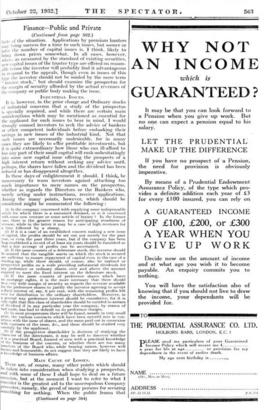It is, however, in the prior charge and Ordinary stocks
of industrial concerns that a study of the prospectus 1 is specially required, and while there are certain main considerations which may be mentioned as essential for the applicant for such issues to bear in mind, I would strongly counsel investors to seek the advice of bankers or other competent individuals before embarking their savings in new -issues of the industrial kind. Not that such issues are necessarily undesirable, for in many cases they are likely to 2-4fer profitable investments, but it is quite extraordinary how those who can ill-afford to lose any part of their small capital will rush unhesitatingly into some new capital issue offering the prospects of a high interest return without seeking any advice until, perhaps, the shares have fallen and the dividend has been reduced or has disappeared altogether.
In these days of enlightenment it should, I think, be unnecessary to warn investors against attaching too much importance to mere names on the prospectus, whether as regards the Directors or the Bankers who, merely acting under instructions, receive applications. Among the many points, however, which should be considered might be enumerated the following : (I) Is the company concerned with supplying some indispensable article for which there is a sustained demand, or is it concerned with some new venture or some article of luxury ? In the former ease, there is the greater reason for anticipating steadiness of revenue, while in the latter it may be a case of high revenues for a time followed by a slump.
(2) If it is a case of an established concern making a new issue of capital, the profits should be set out not merely for the past year, or even the past three years, but if the company has been long established a record of at least six years should be furnished so that a fair average of profits can be ascertained. (3) If the issue consists of a debenture stock, the investor should be assured that the tangible assets on which the stock is secured are sufficient to ensure repayment of capital even in the case of a winding-up; while there should, of course, also be realized or prospective profits on a scale providing substantial dividends for any preference or ordinary shares over and above the amount required to meet the fixed interest on the debenture stock.
(4) If the issue consists of preference shares which have no mortgage rights, it is the more necessary that there should be a very wide margin of security as regards the revenue available for the preference shares to justify the investor agreeing to accept a fixed interest of, say, 6 per cent. with the remaining profits left over for distribution to the ordinary shareholders. Moreover, in a general way preference interest should be cumulative, for it is only right that this class of shareholder should be entitled to arrears of dividend if in any particular year the company, by reason of bad trade, has had to default on its preference charges.
(o) In most prospestuses there will be found, usually in very small print, the various contracts which have been entered into in con- nexion with the issue of shares, and the sums paid out in connexion with expenses of the issue, &c., and these should be studied very Carefully by the applicant.
(6) If the prospective shareholder is desirous of studying the character of the directorate, it may be well to discover whether it is a practical Board, formed of men with a practical knowledge of the business of the concern, or whether there are too many members of the Board who, while bearing names, however well known and honourable, do not suggest that they are likely to have a knowledge of business affairs.














































 Previous page
Previous page